 Quite a while ago, just before the upheavals of the ’60s-shifts that have not ceased, but have been forced in less direct, less public directions — Marcuse in his One-Dimensional Man, described a populace characterized by flattened personality, satisfied and content. With the pervasive anguish of today, who could be so described? Therein lies a deep, if inchoate critique.
Quite a while ago, just before the upheavals of the ’60s-shifts that have not ceased, but have been forced in less direct, less public directions — Marcuse in his One-Dimensional Man, described a populace characterized by flattened personality, satisfied and content. With the pervasive anguish of today, who could be so described? Therein lies a deep, if inchoate critique.
Much theorizing has announced the erosion of individuality’s last remnants; but if this were so, if society now consists of the thoroughly homogenized and domesticated, how can there remain the enduring tension which must account for such levels of pain and loss? More and more people I have known have cracked up. It’s going on to a staggering degree, in a context of generalized, severe emotional disease-ease.
Marx predicted, erroneously, that a deepening material immiseration would lead to revolt and to capital’s downfall. Might it not be that an increasing psychic suffering is itself leading to the reopening of revolt — indeed, that this may even be the last hope of resistance?
And yet it is obvious that “mere” suffering is no guarantee of anything. “Desire does not ‘want’ revolution, it is revolutionary in its own right,” as Deleuze and Guattari pointed out, while further on in Anti-Oedipus, remembering fascism, noting that people have desired against their own interests, and that tolerance of humiliation and enslavement remains widespread.
Read the PDF version
 This zine is a great introduction to identifying, foraging, and using what the authors term “weeds” and “common plants.” The authors wrote it to be an introductory-level guide for anarchists to get more acquainted with the land. It has tips on all sorts of different plants from the well-known dandelion and yarrow to more obscure things like wild carrot. The authors explain how to use parts of easily identifiable trees. For example, you can make a tea out of pine needles that is packed with vitamin C.
This zine is a great introduction to identifying, foraging, and using what the authors term “weeds” and “common plants.” The authors wrote it to be an introductory-level guide for anarchists to get more acquainted with the land. It has tips on all sorts of different plants from the well-known dandelion and yarrow to more obscure things like wild carrot. The authors explain how to use parts of easily identifiable trees. For example, you can make a tea out of pine needles that is packed with vitamin C.
 This zine is an excellent introduction to making your own herbal medicines with plants that you forage yourself in the wild. It features an essay explaining the importance of making our own medicine and then outlines how to make several different types of herbal medicines. These include infusions, decoctions, salves, syrups, infused oils, tinctures, glycerites, etc.
This zine is an excellent introduction to making your own herbal medicines with plants that you forage yourself in the wild. It features an essay explaining the importance of making our own medicine and then outlines how to make several different types of herbal medicines. These include infusions, decoctions, salves, syrups, infused oils, tinctures, glycerites, etc.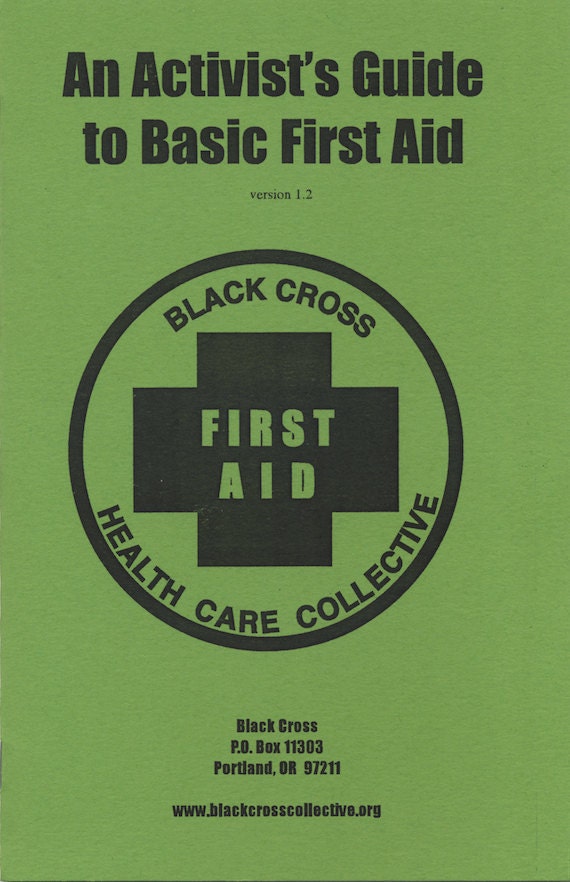
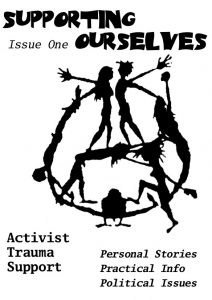 Version 1 of the Activist Trauma Support zine, 36 A5 pages in
Version 1 of the Activist Trauma Support zine, 36 A5 pages in  We believe that there is an urgent need to talk publicly about the relationship between social injustice and our mental health. We believe that we need to start redefining what it actually means to be mentally healthy, not just on an individual level, but on collective, communal, and global levels.
We believe that there is an urgent need to talk publicly about the relationship between social injustice and our mental health. We believe that we need to start redefining what it actually means to be mentally healthy, not just on an individual level, but on collective, communal, and global levels. “Like all governments, presidents, and authority, psychiatry never gave me freedom. Assigned psychiatric labels didn’t help me – they only filled me with an internalized sense of victimhood and inferiority. Medication didn’t ‘cure’ or ‘fix’ me – only damaged me, numbing me to my own senses in order to create an emotional void between me and the fuckery of civilized life. So instead, with nihilist celebration I descend into madness, taking aim at social order and civilization. With armed animalism I realize now that there was to fix my natural contempt for domestication and social control reminds me that I was never ‘broken’ to begin with.”
“Like all governments, presidents, and authority, psychiatry never gave me freedom. Assigned psychiatric labels didn’t help me – they only filled me with an internalized sense of victimhood and inferiority. Medication didn’t ‘cure’ or ‘fix’ me – only damaged me, numbing me to my own senses in order to create an emotional void between me and the fuckery of civilized life. So instead, with nihilist celebration I descend into madness, taking aim at social order and civilization. With armed animalism I realize now that there was to fix my natural contempt for domestication and social control reminds me that I was never ‘broken’ to begin with.” The writers of this book conceptualize emotional resiliency as something to build up and work on collectively, to take inventory of, to find respite in and something to call on as a set of guiding strengths and principles when responding to trauma. Our conceptions are informed by what we know of trauma, PTSD, PTSC and the characteristics of each, which is related in the following pages. We believe it is useful to ground our collective knowledge of trauma in its own particular conceptual and ideological history; integral to our purpose is an alternative to the widely popularized neoliberal notions of self-care that are as disempowering and isolating to us as they are reinforcing to the hegemonies of capital and state power. We aim to propagate resiliency as a methodology to counter the traumas weaponized by the various oppressive forces that divide and diminish us, thereby building our long-term capacity for rebellion against them.
The writers of this book conceptualize emotional resiliency as something to build up and work on collectively, to take inventory of, to find respite in and something to call on as a set of guiding strengths and principles when responding to trauma. Our conceptions are informed by what we know of trauma, PTSD, PTSC and the characteristics of each, which is related in the following pages. We believe it is useful to ground our collective knowledge of trauma in its own particular conceptual and ideological history; integral to our purpose is an alternative to the widely popularized neoliberal notions of self-care that are as disempowering and isolating to us as they are reinforcing to the hegemonies of capital and state power. We aim to propagate resiliency as a methodology to counter the traumas weaponized by the various oppressive forces that divide and diminish us, thereby building our long-term capacity for rebellion against them.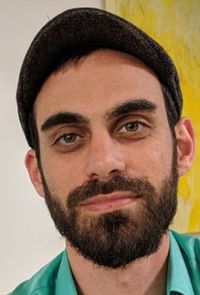 The mental health system, despite all its complexity, can be described as a drainage hole for human suffering. Mostly, the pain that flows into it seeps into the groundwater, but occasionally it will reverse course and erupt into “normal” life as if from a geyser.
The mental health system, despite all its complexity, can be described as a drainage hole for human suffering. Mostly, the pain that flows into it seeps into the groundwater, but occasionally it will reverse course and erupt into “normal” life as if from a geyser.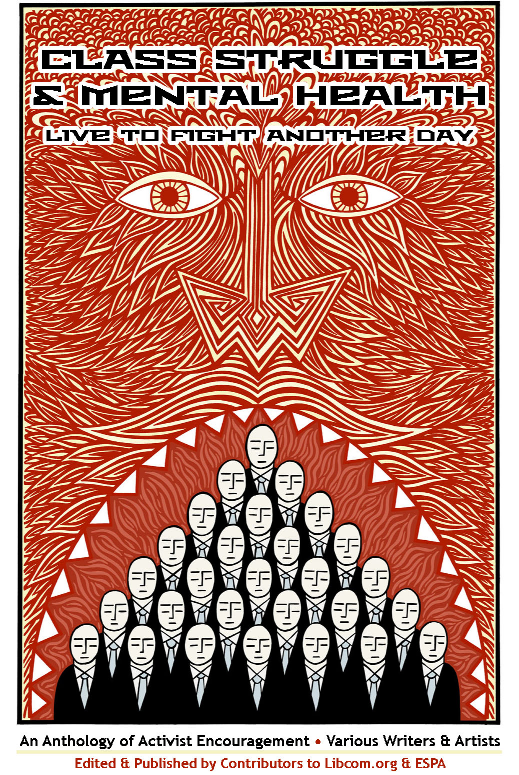 This piece of writing comes out of a series of discussions which occurred on the forums of libcom.org. It was repeatedly raised that depression, mental illness, and emotional stress are very common amongst libertarian political activists. Furthermore, suffering from mental illness as someone who is politically active often comes with its own set of complications. Sometimes the wider anarchist/ activist community is supportive and helpful. Other times, we can feel just as alienated amongst fellow anarchists as we do from the rest of capitalist society.
This piece of writing comes out of a series of discussions which occurred on the forums of libcom.org. It was repeatedly raised that depression, mental illness, and emotional stress are very common amongst libertarian political activists. Furthermore, suffering from mental illness as someone who is politically active often comes with its own set of complications. Sometimes the wider anarchist/ activist community is supportive and helpful. Other times, we can feel just as alienated amongst fellow anarchists as we do from the rest of capitalist society.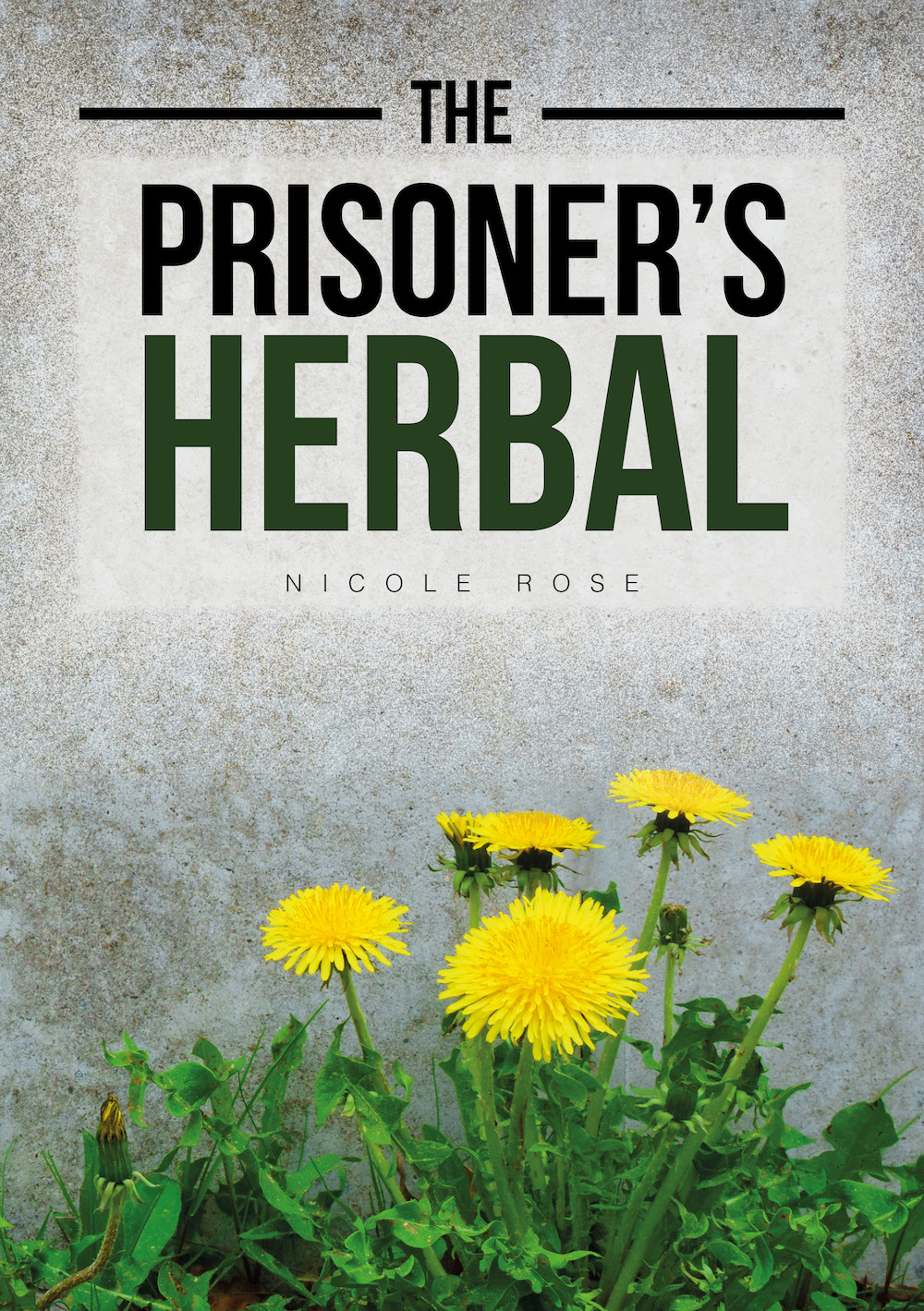 Prisoners all over the world commonly experience medical neglect and a dehumanising separation from wild places. However, weeds come up through the concrete cracks. This book contains detailed profiles of ten plants that are commonly found in prison yards. It is based on my use of plants during my own 3.5-year prison sentence, with suggestions on how to prepare medicines in prison with limited resources.
Prisoners all over the world commonly experience medical neglect and a dehumanising separation from wild places. However, weeds come up through the concrete cracks. This book contains detailed profiles of ten plants that are commonly found in prison yards. It is based on my use of plants during my own 3.5-year prison sentence, with suggestions on how to prepare medicines in prison with limited resources.